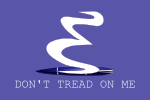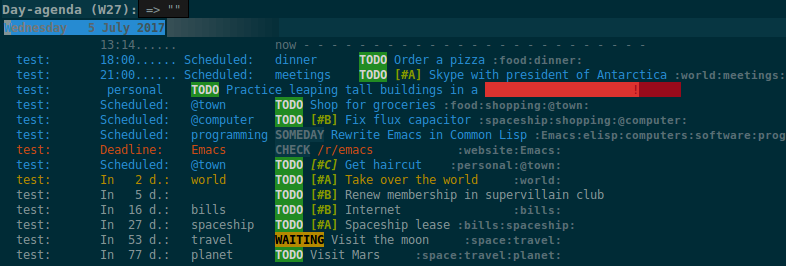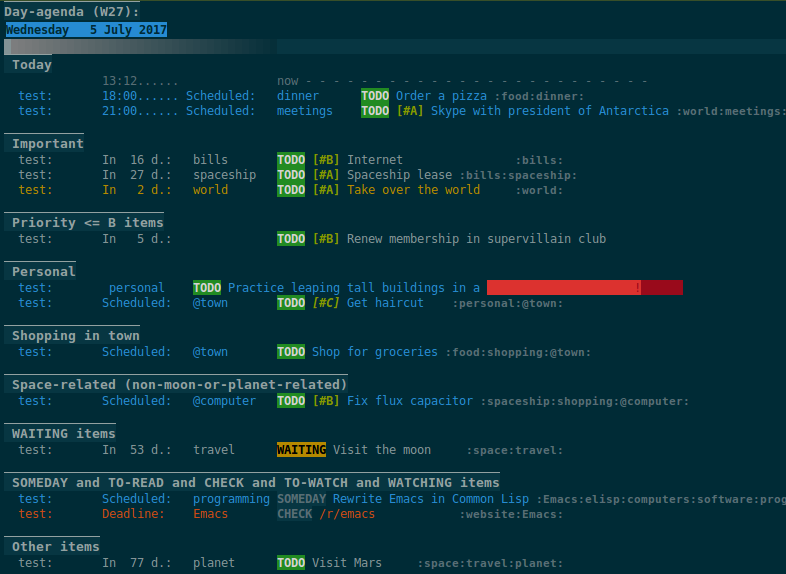
This package lets you “supercharge” your Org daily/weekly agenda. The idea is to group items into sections, rather than having them all in one big list.
Now you can sort-of do this already with custom agenda commands, but when you do that, you lose the daily/weekly aspect of the agenda: items are no longer shown based on deadline/scheduled timestamps, but are shown no-matter-what.
So this package filters the results from org-agenda-finalize-entries, which runs just before items are inserted into agenda views. It runs them through a set of filters that separate them into groups. Then the groups are inserted into the agenda buffer, and any remaining items are inserted at the end. Empty groups are not displayed.
The end result is your standard daily/weekly agenda, but arranged into groups defined by you. You might put items with certain tags in one group, habits in another group, items with certain todo keywords in another, and items with certain priorities in another. The possibilities are only limited by the grouping functions.
The primary use of this package is for the daily/weekly agenda, made by the org-agenda-list command, but it also works for other agenda views, like org-tags-view, org-todo-list, org-search-view, etc.
Here’s what a normal agenda looks like:
Here’s what the “super” agenda looks like:
There are also a few more screenshots.
Just install the org-super-agenda package!
If you want to install manually, you must also install these packages:
- Emacs >= 26.1
dash>= 2.13ht>=2.2org-mode>= 9.0s>= 1.10ts
Then put org-super-agenda.el in your load-path, and eval (require 'org-super-agenda).
- Enable
org-super-agenda-mode. - Set the variable
org-super-agenda-groupsas desired (see example below).Note: In order for groups to be automatically, persistently applied to all agenda buffers, the variable
org-super-agenda-groupsmust be set in the global scope (e.g. withsetqin your init file, or using the customization interface). Alternatively, it can belet-bound in lisp code that callsorg-agendacommands, but in that case, the setting will not persist across agenda commands (so after refreshing an agenda buffer by pressingg, there will be no groups). - Run an Org agenda command.
- Start the day with confidence, knowing that nothing important has been lost in the jumble of ahem overdue items.
At first you might feel bewildered by all the options. Never fear, examples are here!
Here’s the code for the screenshots above. You can test it quickly by evaluating this code block:
(let ((org-super-agenda-groups
'(;; Each group has an implicit boolean OR operator between its selectors.
(:name "Today" ; Optionally specify section name
:time-grid t ; Items that appear on the time grid
:todo "TODAY") ; Items that have this TODO keyword
(:name "Important"
;; Single arguments given alone
:tag "bills"
:priority "A")
;; Set order of multiple groups at once
(:order-multi (2 (:name "Shopping in town"
;; Boolean AND group matches items that match all subgroups
:and (:tag "shopping" :tag "@town"))
(:name "Food-related"
;; Multiple args given in list with implicit OR
:tag ("food" "dinner"))
(:name "Personal"
:habit t
:tag "personal")
(:name "Space-related (non-moon-or-planet-related)"
;; Regexps match case-insensitively on the entire entry
:and (:regexp ("space" "NASA")
;; Boolean NOT also has implicit OR between selectors
:not (:regexp "moon" :tag "planet")))))
;; Groups supply their own section names when none are given
(:todo "WAITING" :order 8) ; Set order of this section
(:todo ("SOMEDAY" "TO-READ" "CHECK" "TO-WATCH" "WATCHING")
;; Show this group at the end of the agenda (since it has the
;; highest number). If you specified this group last, items
;; with these todo keywords that e.g. have priority A would be
;; displayed in that group instead, because items are grouped
;; out in the order the groups are listed.
:order 9)
(:priority<= "B"
;; Show this section after "Today" and "Important", because
;; their order is unspecified, defaulting to 0. Sections
;; are displayed lowest-number-first.
:order 1)
;; After the last group, the agenda will display items that didn't
;; match any of these groups, with the default order position of 99
)))
(org-agenda nil "a"))The groups apply to all agenda commands (at least, every one that calls org-agenda-finalize-entries). You can set different groups for custom commands by setting org-super-agenda-groups in the custom command’s settings list (see the description for org-agenda-custom-commands). You can disable grouping by binding org-super-agenda-groups to nil around a call to an agenda command, or you can disable it globally by disabling the mode.
Each group selector takes an argument which can be a single atom or a list, e.g. :tag takes a string or list of strings. Some selectors are predicates, like :deadline or :habit; for consistency, they also take an argument, but it is ignored.
A group selector creates a section in the agenda containing the items it matches, and any items it doesn’t match are passed to the next group selector.
:discard is a special exception to this: it simply discards any items it matches, and passes through the rest to the next group selector.
Note that the :not group selector creates a group with items it does not match; it can be combined with :discard to discard items that don’t match, e.g. (:discard (:not (:priority "A"))) as the first selector would mean that only priority A items would appear in the agenda, while (:discard (:priority "C")) would mean that any priority C items would not appear in the agenda.
:name- Optionally, set group name header. May be a string; or the symbol
none, in which case no header will be inserted. If:nameis not set at all, the group will be named automatically. :face- A face to apply to items in the group. If face is a plist containing
:append t, it will be appended. See functionadd-face-text-property. :transformer- Used to transform item strings before display. Either a function called with one argument, the item string, or a sexp, in which case the item string is bound to
it.
Every selector requires an argument, even if it’s just t, e.g. :anything, :auto-category, :auto-group, and :discard.
:and- Group ITEMS that match all selectors in GROUP.
:anything- Select every item, no matter what. This is probably most useful with
:discard, because it doesn’t actually test anything, so it’s faster than, e.g.:regexp ".", which has to get the entry text for every item. :auto-category- This automatically groups items by their category (usually the filename it’s in, without the
.orgsuffix). :auto-dir-name- This automatically groups items by the directory name of their source buffer.
:auto-group- This selects items that have the
agenda-groupOrg property set. By setting this property for a subtree, every item in it will be sorted into an agenda group by that name and placed into the agenda where the:auto-groupselector is (example). :auto-map- This automatically groups items by the value returned when applying each item to the given function as a string from the agenda buffer (example). The function should return a string to be used as the grouping key and as the header for its group.
:auto-outline-path- This automatically groups items by their outline path hierarchy, like
Plans/Take over the universe/Take over the moon. :auto-parent- This automatically groups items by their parent heading. This is surprisingly handy, especially if you group tasks hierarchically by project and use agenda restrictions to limit the agenda to a subtree.
:auto-planning- This automatically groups items by their earliest of scheduled date or deadline, formatted according to variable
org-super-agenda-date-format. :auto-priority- This automatically groups items by their priority.
:auto-property- This automatically groups items by the value of the given property (example).
:auto-tags- This automatically groups items by all of their tags (i.e. items with exactly the same tags, in any order, will be grouped together).
:auto-todo- This automatically groups items by their to-do keyword.
:auto-ts- This automatically groups items by the date of their latest timestamp anywhere in the entry, formatted according to variable
org-super-agenda-date-format. :discard- Discard items that match selectors. Any groups processed after this one will not see discarded items. You might use this at the beginning or end of a list of groups, either to narrow down the list of items (used in combination with
:not), or to exclude items you’re not interested in. :not- Group ITEMS that match no selectors in GROUP.
:order- A number setting the order sections will be displayed in the agenda, lowest number first. Defaults to
0. :order-multi- Set the order of multiple groups at once, like
(:order-multi (2 (groupA) (groupB) ...))to set the order of these groups to 2.
These selectors take one argument alone, or multiple arguments in a list.
:category- Group items that match any of the given categories. Argument may be a string or list of strings.
:children- Select any item that has child entries. Argument may be
tto match if it has any children,nilto match if it has no children,todoto match if it has children with any to-do keywords, or a string to match if it has children with certain to-do keywords. You might use this to select items that are project top-level headings. Be aware that this may be very slow in non-daily/weekly agenda views because of its recursive nature. :date- Group items that have a date associated. Argument can be
tto match items with any date,nilto match items without a date, ortodayto match items with today’s date. Thets-datetext-property is matched against. :deadline- Group items that have a deadline. Argument can be
t(to match items with any deadline),nil(to match items that have no deadline),past(to match items with a deadline in the past),today(to match items whose deadline is today), orfuture(to match items with a deadline in the future). Argument may also be given likebefore DATEorafter DATEwhere DATE is a date string thatorg-time-string-to-absolutecan process. :effort<- Group items that are less than (or equal to) the given effort. Argument is a time-duration string, like
5or0:05for 5 minutes. :effort>- Group items that are higher than (or equal to) the given effort. Argument is a time-duration string, like
5or0:05for 5 minutes. :file-path- Group items whose buffers’ filename paths match any of the given regular expressions.
:habit- Group habit items (items which have a
STYLE: habitOrg property). :heading-regexp- Group items whose headings match any of the given regular expressions.
:log- Group Agenda Log Mode items. Argument may be
closeorclosedto select items closed today;clockorclockedto select items clocked today;changedorstateto select items whose to-do state was changed today;tto select any logged item, ornilto select any non-logged item. (See also variableorg-agenda-log-mode-items.) Note that these items may also be matched by the:time-gridselector, so if you want these displayed in their own group, you may need to select them in a group before a group containing the:time-gridselector. :pred- Group items if any of the given predicate functions return non-nil when called with each item as a string from the agenda buffer (example).
:priority- Group items that match any of the given priorities. Argument may be a string or list of strings, which should be the priority letter, e.g.
A. :priority>- Group items that are higher than the given priority, e.g.
C. :priority>=- Group items that are higher than or equal to the given priority, e.g.
B. :priority<- Group items that are lower than the given priority, e.g.
A. :priority<=- Group items that are lower than or equal to the given priority, e.g.
B. :regexp- Group items that match any of the given regular expressions.
:scheduled- Group items that are scheduled. Argument can be
t(to match items scheduled for any date),nil(to match items that are not schedule),past(to match items scheduled for the past),today(to match items scheduled for today), orfuture(to match items scheduled for the future). Argument may also be given likebefore DATEorafter DATEwhere DATE is a date string thatorg-time-string-to-absolutecan process. :tag- Group items that match any of the given tags. Argument may be a string or list of strings.
:time-grid- Group items that appear on the time grid.
:todo- Group items that match any of the given TODO keywords. Argument may be a string or list of strings, or
tto match any keyword, ornilto match only non-todo items.
- An info page is included, with the contents of this readme file.
- Group headers use the keymap
org-super-agenda-header-map, allowing you to bind keys in that map which will take effect when point is on a header.- For example, origami works with
org-super-agendabuffers without any extra configuration. Just activateorigami-modein the agenda buffer and use the commandorigami-toggle-nodeto fold groups. You can bind, e.g.TABto that command in the header map, and then you can easily collapse groups as if they were an outline. You might even fold some automatically (example).
- For example, origami works with
This is a common misunderstanding of how this package works. As written in the introduction, it does not collect items. It only groups items that are collected by Org Agenda or org-ql. So if your Agenda command or org-ql query does not collect certain items, they will not be displayed, regardless of what org-super-agenda groups you configure.
org-ql provides an easier way to write queries to generate agenda-like views that can be grouped with org-super-agenda.
As explained in the usage instructions and shown in the example, items are collected into groups in the order the groups are listed, and empty groups are not shown. To display a group out of the order in which groups are listed, use :order.
Added
- Selector
:auto-planning, which groups items by their earliest of scheduled date or deadline, formatted according to variableorg-super-agenda-date-format. - Selector
:auto-ts, which groups items by the date of their latest timestamp anywhere in the entry, formatted according to variableorg-super-agenda-date-format. - Selector
:auto-tags, which groups items by all of their tags. - Option
org-super-agenda-date-format, used to format date headers in the:auto-dateselector. - To-do keyword faces are applied to keywords in group headers.
- Option
org-super-agenda-header-separatormay also be a character, which is automatically repeated to the window width. (Thanks to YUE Daian.) - Option
org-super-agenda-header-properties. It setsorg-agenda-structural-headerby default, which enables navigating to headers with the defaultM-{/M-}bindings in agenda buffers. (Thanks to Abdul-Lateef Haji-Ali.)
Changed
- Group headers face is now appended to face list instead of overriding it.
- Minimum Emacs version requirement is now 26.1 (required by
tslibrary).
Fixed
:children todogroup selection (#75). (Thanks to Ben Leggett and Elric Milon.):childrengroup headings.- Don’t show blank lines for disabled headers (i.e. with
:name noneandorg-super-agenda-header-separatorset to an empty string). (Fixes #105. Thanks to Florian Schrödl.)
Updated
- Tests updated for Org 9.2.4.
Internal
org-habitis now loaded whenorg-super-agendais loaded. This avoids issues, real and potential, and should not cause any problems.
Fixed
- Selector
:auto-dir-namedid not handle items without markers
Additions
- Keyword
:face, used to apply faces to items in groups. - Keyword
:transformer, used to transform items in groups. - Option
org-super-agenda-header-separator, which can, e.g. be set to an empty string for a more compact view. (Thanks to Sébastien Delafond.) - Face
org-super-agenda-header, which can be used to customize group headers. (Thanks to Christian Schwarzgruber.) - Selector
:auto-map, which groups items by the value returned when applying items to a function. - Selector
:file-path, which groups items by regular expressions matched against their buffers’ filename paths. - Selector
:pred, which matches if any of the given predicate functions return non-nil when called with the item string from the agenda buffer. - Selector
:auto-dir-name, which groups items by the directory name of their source buffer. - Selector
:auto-parent, which groups items by their parent heading. - Selector
:auto-todo, which groups items by their to-do keyword. - Selector
:auto-priority, which groups items by their priority. - Option
org-super-agenda-unmatched-name, used to change the name of the unmatched group. (Thanks to Marcin Swieczkowski.)
Internal
- Refactor auto-groups with macro.
Fixed
- Require
seqlibrary. (Fixes #54. Thanks to Rick Hanson.)
Fixed
- Byte-compiler warnings.
Fixes
- Initialize
org-super-agenda-header-mapto a copy oforg-agenda-mode-map. (Fixes #50. Thanks to Yiufung Cheong.)
First tagged version.
Contributions and feedback are welcome.
If you find this useful, I’d appreciate if you would share a screenshot or two of your agenda views using it (minus any private data, of course). I’d like to get ideas for how to better organize my agenda. :)
- The
org-search-viewagenda command does not seem to set thetodo-statetext property for items it finds, so the:todoselector doesn’t work with it. We should be able to work around this by getting the todo state for each item manually, but we have to make sure that we only do that when necessary, otherwise it might be slow. And I wouldn’t be surprised if there are other selectors that don’t work with this or other commands, butorg-agenda-listshould work fine, andorg-tags-viewandorg-todo-listseem to work.
It’s easy to run the tests:
- Install Cask.
- From the repo root directory, run
cask install, which installs Emacs and package dependencies into the.caskdirectory. - Run
make test.
- Thanks to Balaji Sivaraman for contributing the
:categoryselector. - Thanks to Michael Welle for contributing the customizable
auto-groupOrg property name.
GPLv3+

